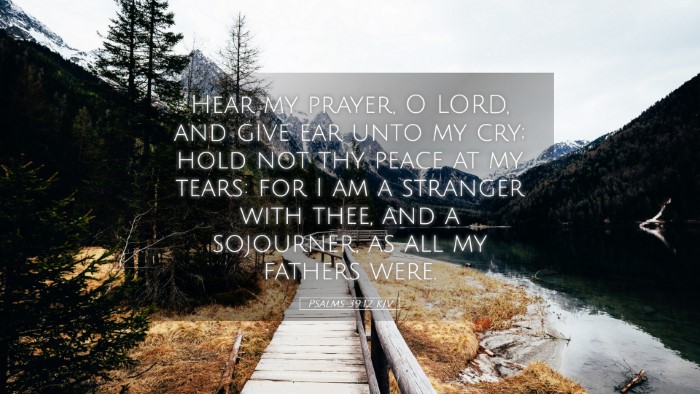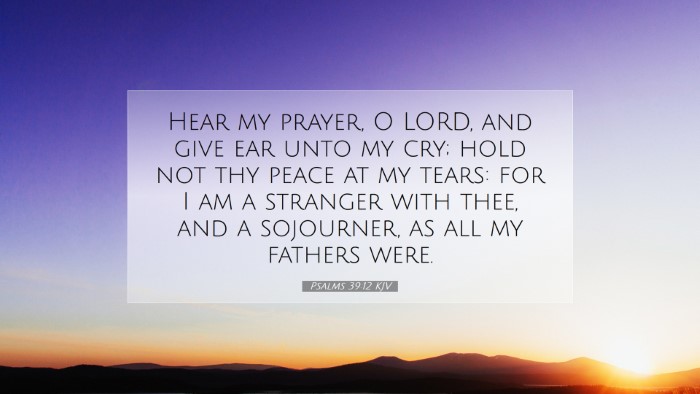Commentary on Psalms 39:12
Psalms 39:12: "Hear my prayer, O Lord, and give ear unto my cry; hold not thy peace at my tears: for I am a stranger with thee, and a sojourner, as all my fathers were."
Introduction
This verse encapsulates a profound moment of introspection and supplication. The Psalmist, in a state of vulnerability, voices a plea for divine attention amid his struggles. It highlights the transient nature of human life in God’s presence, echoing themes of pilgrimage and the need for divine assurance.
Analysis of Key Themes
- Divine Attention: The Psalmist’s request to "hear my prayer" indicates a deep awareness of humanity's need for God’s attention. Many commentators stress that prayer is the conduit through which believers express their dependence on the Lord.
- The Nature of Human Existence: By referring to himself as a "stranger" and "sojourner," the Psalmist highlights the temporary nature of life. This theme is echoed in various Biblical texts, reinforcing the idea that believers are citizens of Heaven (Hebrews 13:14).
- Emotional Plea: The expression "hold not thy peace at my tears" expresses deep emotional pain, underscoring the psalmist's vulnerability. It shows how the anguish of the soul can become the impetus for heartfelt prayer.
Commentary Insights
Matthew Henry
Henry emphasizes the earnestness of the Psalmist’s plea, noting the intense personal struggle as he grapples with his sinfulness and humanity’s frailty. He notes, “We are all strangers and pilgrims, and our comforts should be drawn from God, which is not of this world.” Henry elucidates the believer's position as one who seeks refuge and understanding from the Divine amidst earthly trials.
Albert Barnes
Barnes draws attention to the urgency of the Psalmist's request. He argues that the depiction of the individual as a stranger signifies the ephemeral nature of earthly existence, which Barnes explains as leading us to realize our need for God’s support. He writes, "The heart that beats beneath the weight of tears is often the heart that finds grace in God's ears." Barnes highlights the reciprocal relationship between human sorrow and divine compassion.
Adam Clarke
Clarke reflects upon the collective humanity aspect of the Psalmist's identity, aligning his experiences with that of his ancestors. This connection serves to remind readers that the trials and sufferings faced in life are common to all, and thus, seeking God is a universal action. Clarke also brings out the aspect of humility, as the acknowledgement of one’s status as a sojourner naturally leads to a plea for God's assistance and presence.
Theological Implications
The verse establishes several theological doctrines that resonate deeply within Christian thought:
- Human Fragility: This acknowledgment brings forth the doctrine of human sinfulness and need for redemption. Recognizing one's state as a "stranger" calls for humility and reliance on God.
- God's Faithfulness: The Psalmist’s prayer shows that despite life’s brevity and the emotional turmoil, God remains a pillar of support. His faithfulness is the assurance that believers can cling to.
- Intercessory Prayer: The passage serves to encourage prayer as not merely a ritual but a sincere engagement with the divine, reflecting a heart that is open and cries out for help.
Practical Applications
For pastors, students, and theologians, Psalms 39:12 offers several practical applications:
- Encouragement in Prayer: The plea serves as an encouragement that one’s struggles should naturally lead to prayer, reminding individuals that God hears and cares.
- Understanding Life’s Journey: Recognizing oneself as a "sojourner" encourages believers to cultivate a broader perspective on life that transcends daily struggles and joys.
- Empathy in Ministry: This verse serves as a model for pastoral care, urging those in ministry to be aware of the struggles others face and approach them with compassion and a listening heart.
Conclusion
Psalms 39:12 is a rich verse that invites deep reflection on the nature of human existence, the character of God, and the importance of prayer. Drawing from the insights of established commentaries, we find a resounding call to acknowledge our transience and seek God earnestly. Through this endeavor, believers can find solace in the promise that God is attuned to their cries and ready to provide comfort amidst life’s uncertainties.


